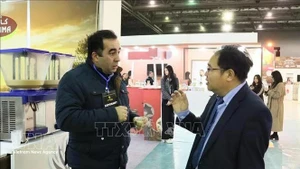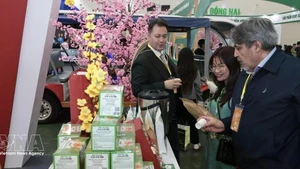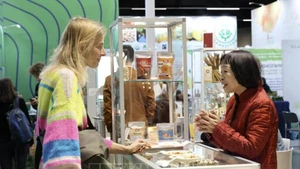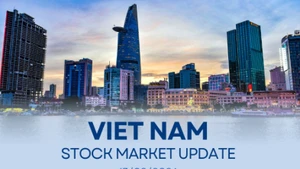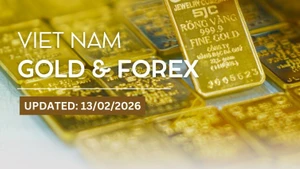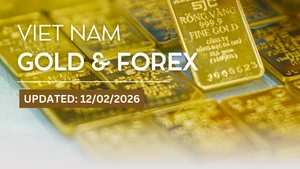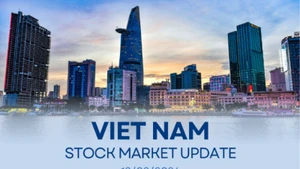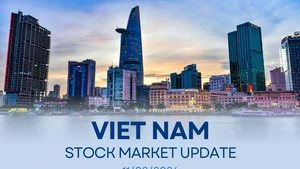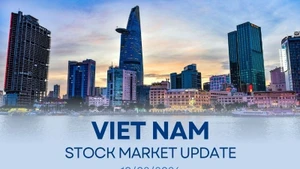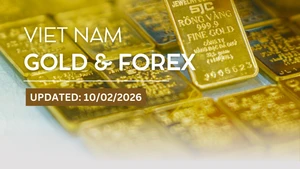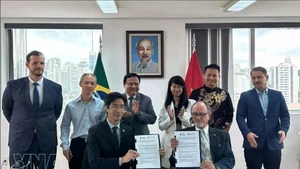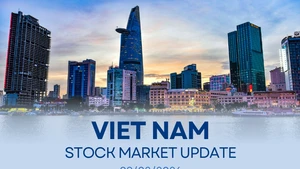The Viet Nam Trade Promotion Agency under the Ministry of Industry and Trade, in coordination with the Vietnamese Embassy in Türkiye and the Foreign Economic Relations Board of Türkiye (DEİK), has organised an online seminar titled “Halal Cooperation between Viet Nam and Türkiye: Current Situation and Prospects.”
The seminar was held in a hybrid format, aiming to strengthen economic and trade cooperation between the two nations regarding Halal products and services. It also helped Vietnamese enterprises showcase their capacity in producing and processing goods and services that comply with international Halal standards.
The event further served as a direct platform for connecting regulatory bodies, certification organisations, industry associations, and the business communities of both countries.
Opening the seminar, Vietnamese Ambassador to Türkiye Dang Thi Thu Ha noted that in the nearly 50 years since establishing diplomatic relations, cooperation between Viet Nam and Türkiye has advanced positively, particularly following the visit of Prime Minister Pham Minh Chinh in 2023.
Among areas of cooperation, Halal is a relatively new but highly promising field in which both countries possess strengths and complementary demands, and which has drawn significant attention from both governments.
Therefore, she stressed, competent authorities and businesses on both sides should seize opportunities and tap into their potential in order to promote cooperation that brings benefits to enterprises as well as to the two nations.
Le Hoang Tai, Deputy Director of the Trade Promotion Agency, highlighted that economic and trade ties between Viet Nam and Türkiye have made notable progress in recent years. Bilateral trade has maintained steady growth, surpassing 2 billion USD in 2024. Viet Nam is currently Türkiye’s second largest trading partner in ASEAN, while Türkiye serves as an important gateway for Vietnamese goods to access the Middle East, Europe, and North Africa.
He underlined that with its large Muslim population, Türkiye is both a consumption market and a developed processing hub for Halal products, while Viet Nam is gradually establishing itself as a reliable supplier of Halal goods, particularly processed foods, agricultural products, beverages, tourism, and logistics services.
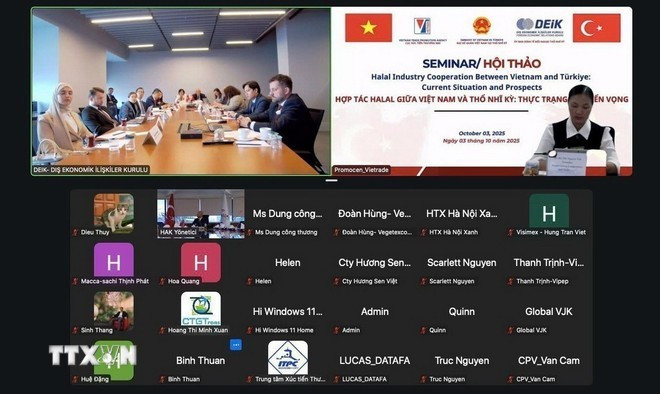
Zafer Soylu, Chairman of the Board of Directors of the Halal Certification Agency in Türkiye, remarked that consumption of Halal-certified products and services is growing strongly worldwide, gaining recognition as a benchmark for safety, hygiene, and quality assurance. On the occasion, he also provided detailed information on the conditions and procedures required for Halal certification of products imported into Türkiye.
Meanwhile, Yunus Ete, Chairman of the World Halal Summit Council, observed that demand for Halal food, cosmetics, pharmaceuticals, and tourism is growing rapidly. In recent years, Viet Nam and Türkiye have made significant progress in developing cooperation in the Halal sector. In his view, with its strategic location bridging Asia and Europe, Türkiye is both a powerful trade partner and a gateway to vast markets.
He further announced that to enhance Halal cooperation among nations, the World Halal Summit and the World Halal Expo will be held from November 26 to 29 in Istanbul, Türkiye, and extended an invitation to Vietnamese agencies and enterprises to participate.
Ramlan Osman, Director of the National Halal Certification Centre (HALCERT), stated that HALCERT has already assisted many Vietnamese businesses in exporting to markets such as Japan and Malaysia. This model, he noted, could easily be expanded to meet Türkiye’s needs.
In addition to Halal certification, HALCERT also plays a role in facilitating B2B trade connections between Vietnamese and Turkish companies, thereby helping boost bilateral economic cooperation.
Despite the great potential, the path to exporting Halal products to Türkiye still presents challenges for Vietnamese businesses, including difficulties in meeting the strict Halal standards.
İhsan Övüt, Secretary General of the Standards and Metrology Institute for Islamic Countries, explained that many countries manage Halal products through their own certification systems. While these systems are well-established, they create certain obstacles for exporters since a common global Halal standard has yet to be agreed upon.
Reha Denemec, a member of the Executive Board of DEİK and Chairman of the Türkiye–Viet Nam Business Council, affirmed that the organisation is ready to connect and support businesses of both sides in cooperation in general and in the Halal sector in particular. DEİK brings together leading Turkish companies and currently operates in 153 countries worldwide.
Speaking at the event, Tran Viet Hung, Head of the Import–Export Department at Visimex Joint Stock Company, emphasised that when exporting Halal products to Türkiye, Vietnamese goods face fierce competition from major players that already hold strong positions in the Halal market, such as India, Brazil, the US, Malaysia, and Indonesia — all of which have highly developed and reputable Halal ecosystems.
To successfully penetrate the Turkish Halal product market, Ba Thi Nguyet Thu, founder of Ha Noi Xanh Cooperative and Halal Viet Nam, argued that obtaining Halal certification is an essential prerequisite. To this end, she suggested establishing a mechanism for mutual recognition of Halal certificates between the two countries, alongside organising training courses and sharing experiences on international Halal standards for enterprises and cooperatives.
Viet Nam is highly focused on developing a Halal ecosystem, seeing it as a strategic pathway that would both open new export opportunities and enhance the nation’s standing in the global value chain.
The Vietnamese Government has been rolling out numerous programmes to help businesses improve production capacity, quality standards, and Halal certification, while actively cooperating with international organisations to facilitate Vietnamese goods’ access to global Muslim markets.

As the state agency responsible for trade promotion, Deputy Director Le Hoang Tai affirmed that the Trade Promotion Agency under the Ministry of Industry and Trade is committed to working closely with the Vietnamese Embassy in Türkiye and the Türkiye–Viet Nam Business Council, as well as relevant authorities, associations, and business communities from both countries. The aim, he stressed, is to accompany enterprises in promoting Halal cooperation, creating favourable conditions for effective and sustainable partnerships, and contributing positively to bilateral economic and trade relations.
It is clear that with the engagement of the government and the efforts of the business community, Viet Nam is gradually shaping a complete Halal ecosystem, not only to serve exports to Muslim countries but also with a vision of building Viet Nam into a regional centre for Halal production, processing, and services in Southeast Asia.

